Organic...The "old," new buzzword.
Written & Compiled by Louis S. Luzzo, Sr.
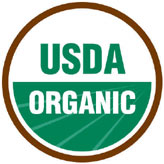 As you may have noticed lately, 'green' is the new wave, from car makers to TV channels to everything in between. With that in mind, and owing to the fact that one of the kings of organic, sustainable foods and produce, Michel Nischan is the subject of our Up Close and Personal this month, we thought that we would rehash for you, the specifics of the word organic and what that truly means. For those of us who are, and have been, familiar with organics, call this a refresher course.
As you may have noticed lately, 'green' is the new wave, from car makers to TV channels to everything in between. With that in mind, and owing to the fact that one of the kings of organic, sustainable foods and produce, Michel Nischan is the subject of our Up Close and Personal this month, we thought that we would rehash for you, the specifics of the word organic and what that truly means. For those of us who are, and have been, familiar with organics, call this a refresher course. 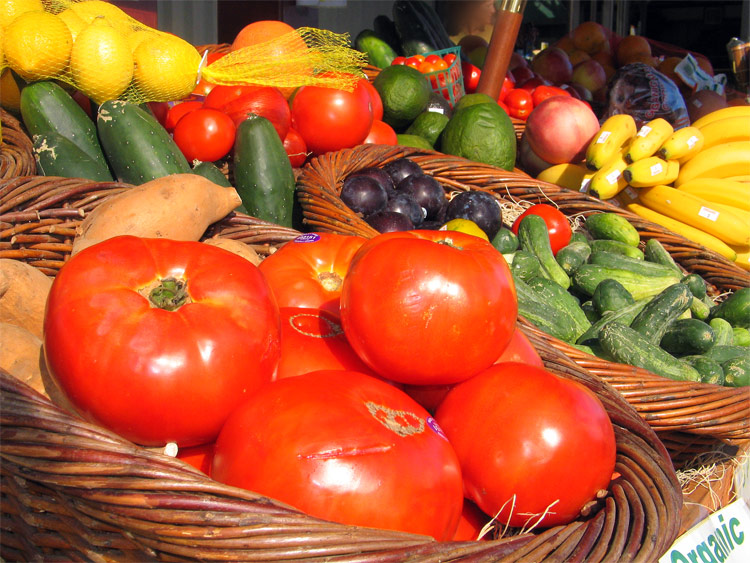
Those of you that may be venturing into the organic world for the first time, will gain a complete understanding of what it means, what it does and how it may, or may not, impact your health, eating and buying habits.
By Definition
First and foremost, let's define exactly what the word 'organic' means in the world of food. When we speak about the term, it simply means 'all the crops and products you are used to buying or consuming, generally 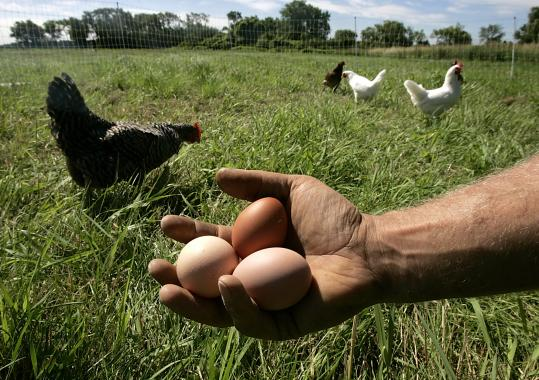 grown without synthetic pesticides, artificial fertilizers, irradiation (a form of radiation used to kill bacteria), or biotechnology. Animals on organic farms eat organically grown feed, aren't confined 100 percent of the time (as they sometimes are on conventional farms), and are raised without antibiotics or synthetic growth hormones.'
grown without synthetic pesticides, artificial fertilizers, irradiation (a form of radiation used to kill bacteria), or biotechnology. Animals on organic farms eat organically grown feed, aren't confined 100 percent of the time (as they sometimes are on conventional farms), and are raised without antibiotics or synthetic growth hormones.'
Now don't be confused, "organic" does not mean "natural." There is no legal definition as to what constitutes a "natural" food. However, the food industry uses the term "natural" to indicate that a food has been minimally processed and is preservative-free. Natural foods can include organic foods, but not all natural foods are organic.
Buying and Shopping
Let's talk about why organic products are a bit more expensive. Higher prices are mostly due to more expensive farming practices, tighter government regulations and lower crop yields. Because organic farmers don't use herbicides or pesticides, many management tools that control weeds and pests are labor intensive. For example, organic growers may hand weed vegetables to control weeds, and you may end up paying a little more for these vegetables.
There are four classifications when it comes to 'organic', so be careful to read the labels, especially when buying a higher priced organic item, as most products in this classification can be between 10-40% higher than the same non-organic products.
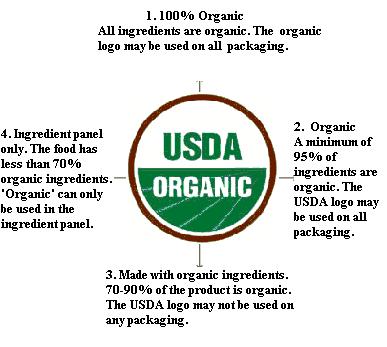
Always remember, just because a product says it's organic or contains organic ingredients, doesn't necessarily mean it's a healthier alternative. Some organic products may still be high in sugar, salt, fat or calories. We believe it’s worth paying more for say, organic apples, peaches, spinach, milk, and beef as examples, in order to avoid the chemicals found in conventionally produced versions of those items. Organic foods meet the same quality and safety standards as non-organic foods. The difference lies in how the food is produced, processed and handled. For instance, organic fruits and vegetables spoil faster because they aren't treated with waxes or preservatives. This quicker perishability means that to get the most out of these products you should make your trips to the market more frequenty, buying smaller quantities.
You'll notice the upside to this is fresher, better tasting ingredients and will find it worth the added trip. Also, expect less-than-perfect appearances in some organic produce, ie; odd shapes, varying colors and perhaps smaller sizes. I'm sure we are all familiar with the exponentially better taste of 'ugly tomatoes,' so don't let appearances fool you. However, in most cases, organic foods look identical to their conventional counterparts. And, of course, when it comes to fresh produce, remember that you’ll save by buying it in season.
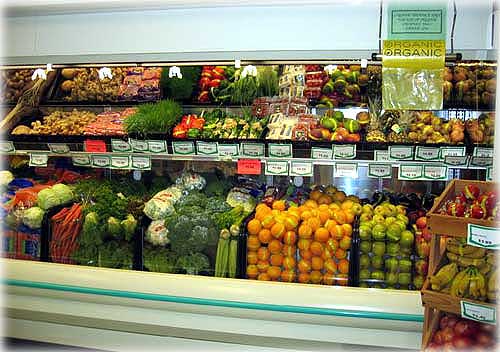 When selecting a store from which to buy your organic products, make sure you get what you pay for by watching where produce sits on shelves. All grocers are legally required to stack organic fruits and vegetables where they won’t be exposed to water runoff from the misting of conventional produce, which could contaminate organic items with pesticide residue. If a store is not following that rule, you may be wasting your money by
When selecting a store from which to buy your organic products, make sure you get what you pay for by watching where produce sits on shelves. All grocers are legally required to stack organic fruits and vegetables where they won’t be exposed to water runoff from the misting of conventional produce, which could contaminate organic items with pesticide residue. If a store is not following that rule, you may be wasting your money by
buying organic produce there. Also, try to buy your produce the day it's delivered to market to ensure that you're buying the freshest food possible. Ask your grocer what day new produce arrives, most will be happy to let you know their delivery schedule.
Make sure you comparison shop. Do a price check among local grocery stores for often purchased organic items and shop where you find the lowest prices. Also, try to always buy local. You can find organic growers at most farmer’s markets, and a USDA study in 2002 found that about 40 percent of those farmers don’t charge a premium. For listings of local farmer’s markets and other sources, go to www.ams.usda.gov/farmersmarkets and www.localharvest.org .
Health Aspects
Organic foods may have higher nutritional value than conventional food, according to some research. The reason: In the absence of pesticides and fertilizers, plants boost their production of the phytochemicals (vitamins and antioxidants) that strengthen their resistance to bugs and weeds. Some studies have linked pesticides in our food to everything from headaches, to cancer, to birth defects, even though many 'experts' maintain that the levels in conventional food are safe for most healthy adults. My opinion here is that there is no 'acceptable ' level of a contaminant that is harmful to you. Whether it is in 'acceptable' levels that harm you slowly, or high levels that harm you quickly, the key word to me here is 'harm!" Even low-level pesticide exposure, however, can be significantly more toxic for fetuses and children (due to their less-developed immune systems) and for pregnant women (it puts added strain on their already taxed organs), according to a report by the National Academy of Sciences.
Pesticide contamination isn't as much of a concern in meats and dairy products (animals may consume some pesticides, depending on their diet), but many scientists are concerned about the antibiotics being given to most farm animals:" Many are the same antibiotics humans rely on, and overuse of these drugs has already enabled bacteria to develop resistance to them, rendering them less effective in fighting infection," so says Chuck Benbrook, Ph.D., chief scientist at the Organic Center, a nonprofit research organization.
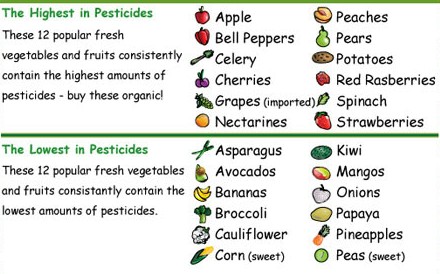
A growing body of research shows that pesticides and other contaminants are more prevalent in the foods we eat, in our bodies, and in the environment than we thought. And studies show that by eating organic foods, you can reduce your exposure to the potential health risks associated with those chemicals. What you add in expense for buying 'organic' will result in your overall better health and you'll save on doctor and medical costs in the long run. Remember though, eating healthy is just one aspect of taking better care of your body.
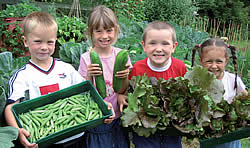 Data From Wikpedia about health benefits to children: "Parents are concerned about the potential neurological health risks posed to children by trace pesticide residues in food. A 2001 study demonstrated that children fed organic diets experienced significantly lower organophosphorus pesticide exposure than children fed conventional diets. A similar study in 2006 measured the levels of organophosphorus pesticide exposure in 23 preschool children before and after replacing their diet with organic food: levels of organophosphorus pesticide exposure dropped dramatically and immediately when the children switched to an organic diet. Although the researchers did not collect health outcome data in this study, they concluded "it is intuitive to assume that children whose diets consist of organic food items would have a lower probability of neurologic health risks."
Data From Wikpedia about health benefits to children: "Parents are concerned about the potential neurological health risks posed to children by trace pesticide residues in food. A 2001 study demonstrated that children fed organic diets experienced significantly lower organophosphorus pesticide exposure than children fed conventional diets. A similar study in 2006 measured the levels of organophosphorus pesticide exposure in 23 preschool children before and after replacing their diet with organic food: levels of organophosphorus pesticide exposure dropped dramatically and immediately when the children switched to an organic diet. Although the researchers did not collect health outcome data in this study, they concluded "it is intuitive to assume that children whose diets consist of organic food items would have a lower probability of neurologic health risks."
Taste
Obviously taste is subjective, as everyone's palate is different. Our suggestion is to do a side by side tasting and decide for yourself. We believe that most will find that the better taste of organic verses non-organic is completely evident. There, of course, may be some that disagree, but one thing is certain. Regardless of whether you find the taste better, or the same, as conventional products, common sense dictates that NOT eating and consuming pesticides, preservatives, growth hormones or food that has been irradiated, has to be less harmful to you and is therefore, better for you.
Organic Farming
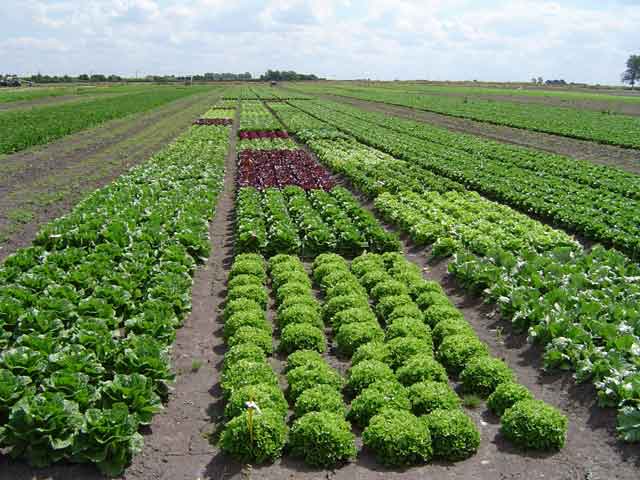 Here's where the 'green' portion of organics is making its impact. Organic methods as compared to conventional methods are having a healthier, more positive affect on our environment than previously believed. Here's why:
Here's where the 'green' portion of organics is making its impact. Organic methods as compared to conventional methods are having a healthier, more positive affect on our environment than previously believed. Here's why:
Organic farming reduces pollutants in groundwater and creates richer soil that aids plant growth while reducing erosion, according to the Organic Trade Association. It also decreases pesticides that can end up in your drinking glass; in some cities, pesticides in tap water have been measured at unsafe levels for weeks at a time, according to an analysis performed by the Environmental Working Group (EWG). Plus, organic farming used 50 percent less energy than conventional farming methods in one 15-year study.
When taking into account the impact on soils and biodiversity, there is an average of 30% more species on organic farms than there are on farms using conventional farming methods. Birds, butterflies, soil microbes, beetles, earthworms, spiders, vegetation, and mammals are particularly affected. Almost all non-crop, naturally-occurring species that were studied demonstrated a preference in organic farming both by population and richness. Many weed species attract beneficial insects that improve soil qualities and forage on weed pests. Organisms which are soil-bound usually benefit because of increased bacteria populations. This is due to natural fertilizer spreads such as manure, while at the same time, a reduction in the intake of herbicides and pesticides commonly associated with conventional farming methods.
A Comparison
| Conventional farmers | Organic farmers |
|---|---|
| Apply chemical fertilizers to promote plant growth. | Apply natural fertilizers, such as manure or compost, to feed soil and plants. |
| Spray insecticides to reduce pests and disease. | Use beneficial insects and birds, mating disruption or traps to reduce pests and disease. |
| Use chemical herbicides to manage weeds. | Rotate crops, till, hand weed or mulch to manage weeds. |
| Give animals antibiotics, growth hormones and medications to prevent disease and spur growth. | Give animals organic feed and allow them access to the outdoors. Use preventive measures, such as rotational grazing, a balanced diet and clean housing, to help minimize disease. |
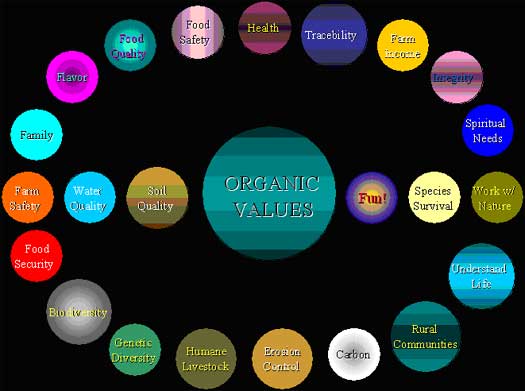
We believe that a healthier climate and environment, along with a healthier diet and lifestyle go a long way to improving the quality of life overall. You may not need to purchase organics across the board when shopping for yourself or your family, but if you slowly incorporate healthier and more sustainable products into your buying habits and lifestyle, we all benefit from the impact and can all experience a better existence on this planet. Why do we believe this? Well, after all, one of our mantras is "Good Living" and while most would interpret that we mean 'the good life,' we here at Gourmet Girl Magazine interpret that as " Being good to yourself, your family, friends, neighbors, and the planet as a whole." We hope you learned something from this feature. I know I did.


